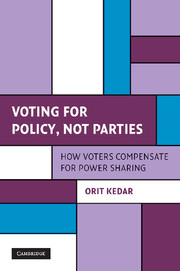Book contents
- Frontmatter
- Contents
- List of Tables and Figures
- Acknowledgments
- PART 1 VOTING FOR POLICY
- PART II EMPIRICAL EVIDENCE: HOW VOTERS COMPENSATE FOR DIFFUSION OF POWER
- 3 Compensatory Vote in Parliamentary Democracies
- 4 Balancing Strong (and Weak) Presidents
- 5 Compensatory Vote in Federations: Evidence from Germany
- PART III THEORETICAL IMPLICATIONS
- References
- Index
- Miscellaneous Endmatter
3 - Compensatory Vote in Parliamentary Democracies
Published online by Cambridge University Press: 19 January 2010
- Frontmatter
- Contents
- List of Tables and Figures
- Acknowledgments
- PART 1 VOTING FOR POLICY
- PART II EMPIRICAL EVIDENCE: HOW VOTERS COMPENSATE FOR DIFFUSION OF POWER
- 3 Compensatory Vote in Parliamentary Democracies
- 4 Balancing Strong (and Weak) Presidents
- 5 Compensatory Vote in Federations: Evidence from Germany
- PART III THEORETICAL IMPLICATIONS
- References
- Index
- Miscellaneous Endmatter
Summary
INTRODUCTION
How does voter choice depend on institutional environment? In Chapter 2, I presented a model of voter choice in parliamentary and other democracies. I showed that, other things being equal, in political systems that facilitate bargaining and compromise, a party ideologically similar to the voter may often be less effective in representing her interests than a party placed away from her and away from the center of gravity of the party system. In systems in which policy is determined by a few political actors, on the other hand, policy formation involves little compromise, and thus voter motivation to turn to extreme parties is diminished.
In this chapter, I test the implications of the compensatory model in parliamentary environments. Before turning to the details of the empirical analysis, let us review these implications and preview the findings. The implications are clear. The more compromise and power sharing facilitated by parliamentary norms and procedures and by the electoral system, the more voters will compensate for such expected compromise that threatens to dilute their vote after it is cast. The more compensatory voters are, the more likely they are to support parties whose positions differ from and are often more extreme than their own. This principle may help us understand regularities such as the one presented in Figure 1.1 in which relatively moderate voters often support relatively extreme parties.
- Type
- Chapter
- Information
- Voting for Policy, Not PartiesHow Voters Compensate for Power Sharing, pp. 65 - 101Publisher: Cambridge University PressPrint publication year: 2009

